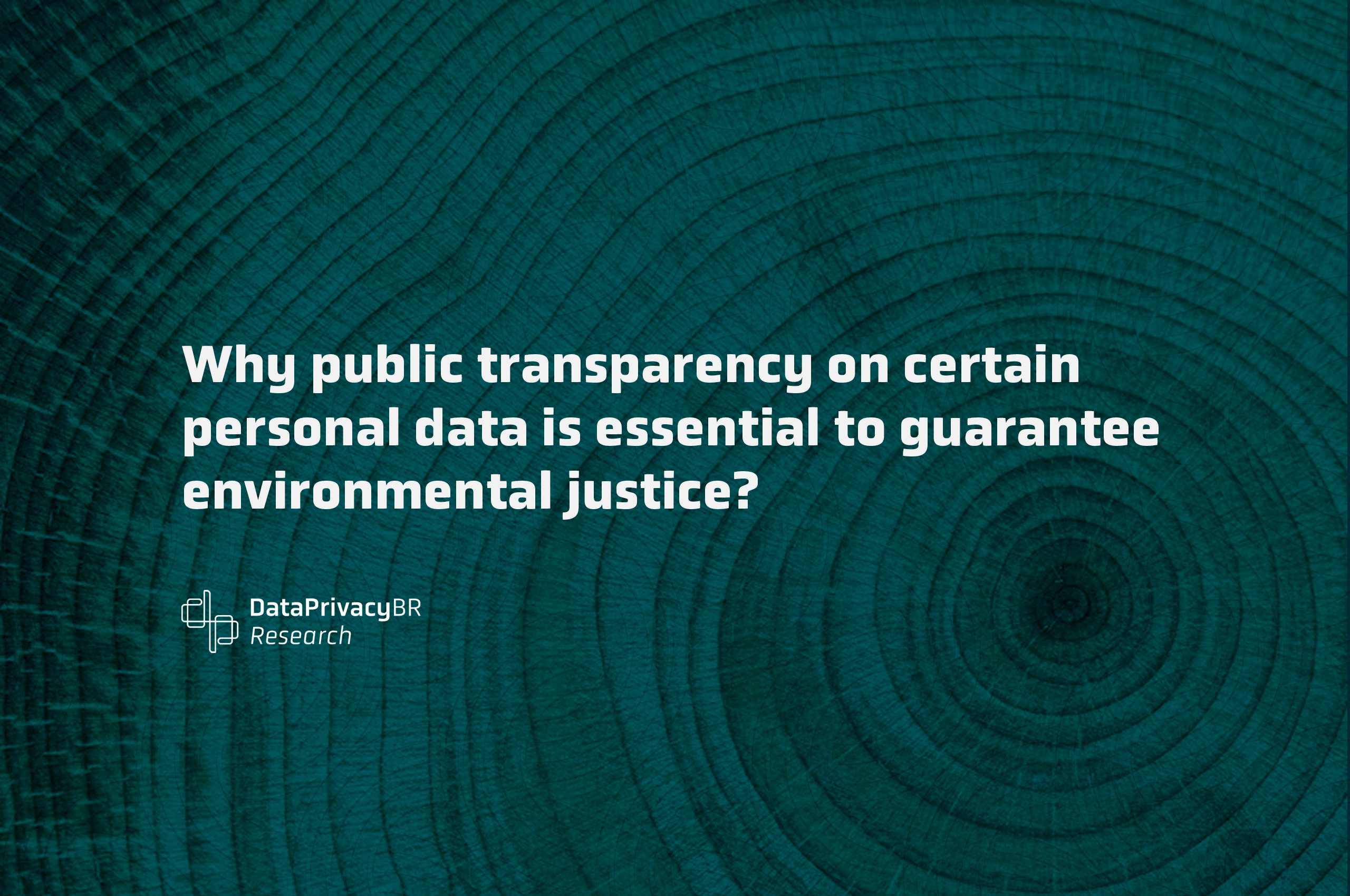Why public transparency on certain personal data is essential to guarantee environmental justice?
Between 2022 and 2023, Data Privacy Brasil developed the project Environment and Information: contesting the political instrumentalization of LGPD in Environmental Regulation which focuses on the intersection of digital rights and environmental policies.
Between 2022 and 2023, Data Privacy Brasil developed the project Environment and Information: contesting the political instrumentalization of LGPD in Environmental Regulation which focuses on the intersection of digital rights and environmental policies. The first phase of the project analysed a denial of a FOI request regarding personal information in the Environmental Rural Registry (CAR) database and argued for the possibility of amplifying public transparency. The second phase dealt with the lack of transparency of the Animal Transit Note (GTA), a sanitary warrant that allows for sanitary traceability of animal transportation – cattle farming and beef industry more specifically was the scope of the project.
In both reports a constant asymmetry was identified relating to how personal data from land and cattle owners were processed. Privacy is guaranteed over public interest and other fundamental rights and principles such as the right to an ecologically balanced environment, originary rights to the land, right to life and physical integrity, principle of dignity and economical order. This endorses illegal practices and damages from protected land invasion, illegal deforestation, increase in the vulnerability of local populations to violation of work laws, unfair competition, etc.
In this scenario of numerous irregularities and inequalities, the improvement of land monitoring and control and the expansion of cattle traceability to include an environmental perspective are of extreme importance. Additionally, transparency of identifiers as individual or cooperative taxpayer number is fundamental in order to allow social control to request public action towards violations of environmental law and to blow the whistle on potential illegal deforestation and other illicit or unethical conducts. Public transparency in this case also allows for a detailed analysis of the market of suppliers which gives more autonomy for citizens as consumers.
That said, during the course of the project, it was clear the importance of CAR as digital public infrastructure that has the potential to be molded to guarantee efficient data sharing and interoperability between databases such as GTA – which could lead to a preliminary model of traceability led by the government. An in-depth analysis on the relation of climate change and digital public infrastructures is presented in the report Digital Public Infrastructures & Digital Public Goods for Combating Climate Change: The Brazil Case Study, a result of a DPGA funded project. The theme of environment and digital media is discussed in the Politics article The nexus between environment and digital age passing through difficulties of transparency to exploitation of natural resources to fuel digital innovation and advance.
In order to best summarise the problems that are related to the lack of public transparency of data necessary to achieve climate justice, and also listing its consequences and recommendations to help to solve them, Data Privacy Brasil published two policy papers regarding each phase of the project Environment and information.
You can access the policy papers on the links below:
Veja também
-
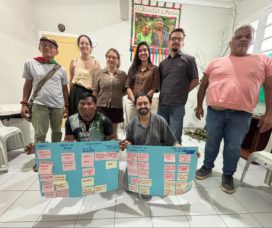
COP30, Data and Land Use: Discussing Agendas to Combat Land Grabbing
On November 12, 2025, Data Privacy Brasil held a roundtable discussion on data and land grabbing as part of the COP do Povo program, a parallel event to COP30, entitled "COP30, Data and Land Use: Discussing Agendas to Combat Land Grabbing,".
-

COP30: Why local communities must have access to environmental information in data center development
At COP30, Brazil speaks of reforestation and indigenous wisdom. But Bruno Bioni, Mariana Rielli, and Rafael Zanatta argue that the country’s generous tax incentives for data centers must be tied to the collective right of access to environmental information, or risk deepening the very injustices the climate summit seeks to undo.
-

COP30 Dialogues: Interview with Antônio Laranjeira
In the second interview for our special series “COP30 Dialogues: Digital Rights and Climate Justice,” we spoke with Antônio Laranjeira, an award-winning journalist for investigative reporting on topics such as environmental loss and damage, science, and citizenship.
-

COP30 Dialogues: Interview with Lori Regattieri
Data Privacy Brasil launches the new interview series “COP30 Dialogues: digital Rights and Climate Justice,” aiming to hear diverse voices on the interface between the climate agenda and digital rights. The new project emerges in a unique year: the first United Nations Climate Change Conference (COP30) in Brazil.
-
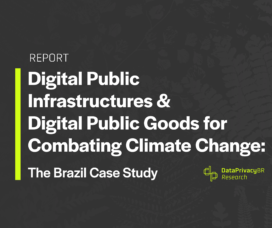
Digital Public Infrastructures & Digital Public Goods for Combating Climate Change: The Brazil Case Study
Data Privacy Brasil, with the support of the Digital Public Goods Alliance (DPGA), launches a new report that aims to analyze the integration between Digital Public Infrastructure (DPI) and Digital Public Goods (DPGs) as tools to combat climate change.
-
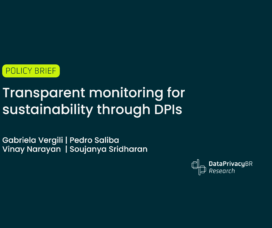
Transparent monitoring for sustainability through DPIs
In this new publication, researchers Gabriela Vergili, Pedro Saliba from Data Privacy Brasil, Vinay Narayan and Soujanya Sridharan from Aapti Institute, discuss the “Transparent monitoring for sustainability through DPIs”.
-
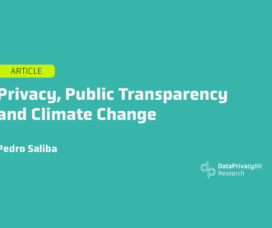
Privacy, Public Transparency and Climate Change
How transparency and data protection can help environmental public policies in Brazil.
Veja Também
-

COP30, Data and Land Use: Discussing Agendas to Combat Land Grabbing
On November 12, 2025, Data Privacy Brasil held a roundtable discussion on data and land grabbing as part of the COP do Povo program, a parallel event to COP30, entitled "COP30, Data and Land Use: Discussing Agendas to Combat Land Grabbing,".
-

COP30 Dialogues: Interview with Antônio Laranjeira
In the second interview for our special series “COP30 Dialogues: Digital Rights and Climate Justice,” we spoke with Antônio Laranjeira, an award-winning journalist for investigative reporting on topics such as environmental loss and damage, science, and citizenship.
-

COP30 Dialogues: Interview with Lori Regattieri
Data Privacy Brasil launches the new interview series “COP30 Dialogues: digital Rights and Climate Justice,” aiming to hear diverse voices on the interface between the climate agenda and digital rights. The new project emerges in a unique year: the first United Nations Climate Change Conference (COP30) in Brazil.
-

Digital Public Infrastructures & Digital Public Goods for Combating Climate Change: The Brazil Case Study
Data Privacy Brasil, with the support of the Digital Public Goods Alliance (DPGA), launches a new report that aims to analyze the integration between Digital Public Infrastructure (DPI) and Digital Public Goods (DPGs) as tools to combat climate change.
-

Transparent monitoring for sustainability through DPIs
In this new publication, researchers Gabriela Vergili, Pedro Saliba from Data Privacy Brasil, Vinay Narayan and Soujanya Sridharan from Aapti Institute, discuss the “Transparent monitoring for sustainability through DPIs”.
-

Privacy, Public Transparency and Climate Change
How transparency and data protection can help environmental public policies in Brazil.
DataPrivacyBr Research | Content under licensing CC BY-SA 4.0

